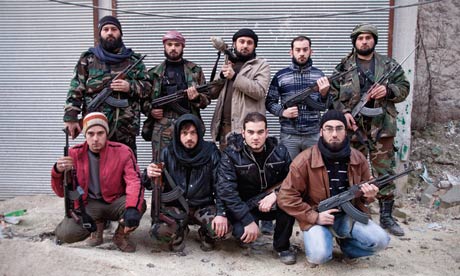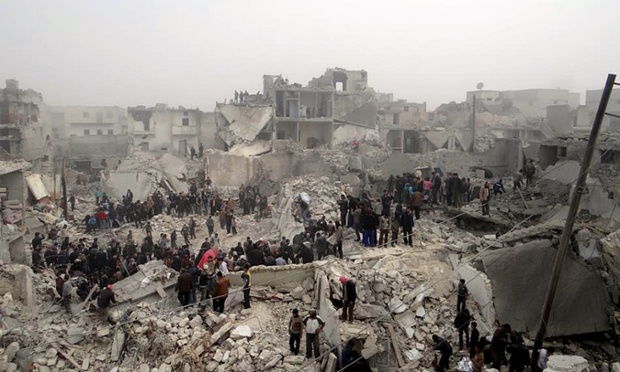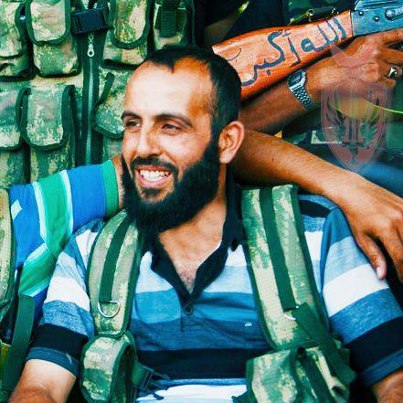Raqqa Falls – (4 March 2013) Assad’s Interview with Hala Jaber
Posted by Joshua on Monday, March 4th, 2013
On Monday, government forces, backed by pro-regime militiamen, launched a major offensive on opposition held areas in the central city of Homs. Evidently, regime forces are also attacking north of Latakia, in an effort to push back rebels to the north as well. As the government losses territory around Aleppo and to the East around Raqqa and the Jazira, the regime seems to be fattening up the region around the Alawite Mountains.
Dozens of Syrian troops killed in Iraq ambush – al-Jazeera
At least 42 Syrians and seven Iraqis are killed in Anbar by an attack on a convoy carrying troops who crossed into Iraq.
Syrian Rebels Capture Most of Northern City
2013-03-04 By BASSEM MROUE
Beirut (AP) — Syrian rebels pushed government troops from most of the northern city of Raqqa Monday, and then scores of cheering protesters tore up a poster of President Bashar Assad and toppled a bronze statue of his late father and predecessor, activists said.
Der Spiegel: EU May Provide Weapons Training to Syrian Rebels
2013-03-04
Officially, the statement released by Brussels last week on the European Union’s amended sanctions against Syria referred merely to supplying rebel fighters with “non-lethal military equipment” and “technical assistance for the protection of …
Syria President Al-Assad’s Interview with The Sunday Times
By Bashar al-Assad
The full interview has been copied by Global Research, March 03, 2013, Sunday Times and SANA
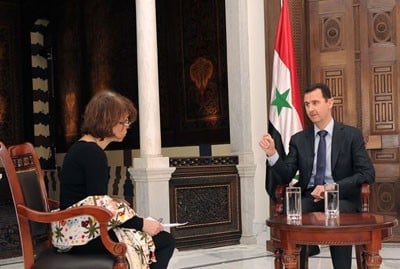
Sunday Times: Mr. President your recent offer of political dialogue was qualified with a firm rejection of the very groups you would have to pacify to stop the violence: the armed rebels and the Syrian National Coalition, the main opposition alliance.
So in effect you are only extending an olive branch to the loyal opposition, mostly internal, that renounce the armed struggle, and who effectively recognizes the legitimacy of your leadership, who are you willing to talk to, really?
President Assad: First of all, let me correct some of the misconceptions that have been circulating and that are found in your question in order to make my answer accurate.
Sunday Times: Okay.
President Assad: Firstly, when I announced the plan, I said that it was for those who are interested in dialogue, because you cannot make a plan that is based on dialogue with somebody who does not believe in dialogue. So, I was very clear regarding this…..
Hague dismisses Assad as ‘delusional’ –
March 3 (Telegraph) — William Hague described Bashar al-Assad as “delusional”, after the Syrian President accused Britain of funding terrorism inside the country. The Foreign Secretary said the embattled dictator was “presiding over this slaughter” in Syria whilst Britain is “sending food and shelter and blankets to help people driven from their homes and families in his name.”
“This will go down as one of the most delusional interviews that any national leader has given in modern times,” he told the BBC….
 Khatib visits Aleppo villages as Syria opponents vote for council
Khatib visits Aleppo villages as Syria opponents vote for council
Opponents of Syrian President Bashar al-Assad voted on Sunday to elect 29 provincial council members to run rebel-held areas in the northern province of Aleppo, organizers and participants told AFP. “For the first time, Aleppo will have a freely elected provincial … Read More
LA Times [Reg]: Syria’s president says rebels must disarm before talks
2013-03-04
Exposing a rift in policy between US and Saudi Arabia – Wash Post
Kerry met Monday with Saudi diplomats who staked out a more aggressive posture on providing arms to Syrian rebels, exposing a rift in policy between the two regional allies. …“Saudi Arabia will do everything in its capacity. We do believe that what is happening in Syria is a slaughter — a slaughter of innocents,” Prince Saud al-Faisal said during a visit by Secretary of State John F. Kerry. “We cannot bring ourselves to remain silent. Morally there is a duty.”….“There is no guarantee that one weapon or another might not, at some point in time, fall into the wrong hands,” Kerry said a news conference with the veteran Saudi diplomat.
US should focus aid on Syrian refugees
By Juliette Kayyem | Globe, March 04
The numbers of people who have fled to neighboring countries can no longer be sustained, and keeping them safe will pay dividends long after the war in Syria is over.
 Ra’s al-Ain and Patchwork Alliances in the Kurdish areas of Syria – BBC
Ra’s al-Ain and Patchwork Alliances in the Kurdish areas of Syria – BBC
Ras al-Ain – or Serekani in Kurdish – in north-east Syria is an area divided between Arab tribes and Kurds.
There are also other ethnic groups, including a few Chechens and Ingush, whose ancestors migrated there from the North Caucasus in the beginning of the 20th century.
After about four months of absence, Walid Didigov – a Syrian of Ingush origin – appeared suddenly by instant message on my Facebook page.
He popped up a few days after Syrian rebels and a Kurdish militia, who have been fighting each other for months in a town near the Turkish border, signed a ceasefire.
I responded immediately. He was using a very slow internet connection and apologised for interruptions, which were also due to frequent power cuts.
“The ceasefire allowed me to reconnect,” he told me. “This time I have joined the rebels, alongside my brothers and relatives. We have to choose between right and wrong and we choose to be on the righteous side: against the regime.”
Mr Didigov says that he and his Chechen-Ingush relatives co-ordinate with “all armed groups in the area that are fighting against Kurdish militants supported by regime”….
Rebels accuse Syria’s Kurds of exploiting the war in Syria to assert control over parts of the north-east.
Mr Didigov says: “We are fighting alongside various groups in Ras al-Ain: the Free Syrian Army (FSA), Ghuraba al-Sham, Ahrar al-Sham – sometimes we co-operate with al-Nusra front.”…. “Turkey is afraid of Kurdish independence in Syria, and will make allegiances with anyone to stop them, therefore they are supporting the armed groups in Ras al-Ain against Kurdish militias,” he says. The FSA, he says, wants the fighting to continue in Ras al-Ain to keep Turkish support coming….
Al-Nusra jihadists, however, are remaining neutral in this fight in Ras al-Ain. “They are wining hearts and minds by reopening bakeries and providing gas for people,” Mr Didigov tells me.
The leader of al-Nusra in the area is a Kurd himself and Mr Didigov asked him why they are staying neutral. The leader said that they “need Kurds to help us to advance in Qamishli (north-east), which is dominated by Kurds.”
‘Bullying’ Britain fanning the flames, warns Assad; In a rare interview, the Syrian leader says the West is supporting terrorism and vows revenge on Israel
HALA JABER DAMASCUS, 3 March 2013, The Sunday Times
AFTER 23 months of a conflict that has ripped his country apart, the Syrian president, Bashar al-Assad, was in no mood to contemplate giving up the fight and going into exile.
“No patriotic person will think about living outside his country. I am like any other patriotic Syrian,” he said in an interview last week, when I asked if he would leave to improve the prospects for peace. In any case, he said, it was nonsense to suggest that the conflict was about the president and his future.
“If this argument is correct, then my departure will stop the fighting. Clearly this is absurd, and recent precedents in Libya, Yemen and Egypt bear witness to this.” Assad spoke softly throughout the hour-long interview, his first with a western newspaper for more than a year, but he had harsh words for his opponents. He vowed that Syria would retaliate against Israel for an airstrike on a research centre in Damascus last month.
He accused John Kerry, the American secretary of state, of wasting time by trying to ease him out of power, saying his leadership was an internal matter, “so I am not going to discuss it with anyone who is coming from abroad”.
His most withering criticism, however, was directed at Britain. Instead of pushing for peace talks, he said, David Cameron’s “naive, confused, unrealstic” government was trying to end an EU arms embargo so that the rebels could be supplied with weapons.
This, he said, would fan the flames of war at a time when an al-Qaeda-backed element of the uprising, Jabhat al-Nusra, was already “killing, beheading, torturing and preventing children from going to school”. “We do not expect an arsonist to be a firefighter,” he said, dismissing any suggestion that Britain could help to resolve the conflict.
“To be frank, Britain has played a famously unconstructive role in our region on different issues for decades, some say for centuries … The problem with this government is that their shallow and immature rhetoric only highlights this tradition of bullying and hegemony … “How can we ask Britain to play a role while it is determined to militarise the problem? How can we expect them to make the violence less while they want to send military supplies to the terrorists?” Yet Assad adopted a conciliatory tone towards the Syrian opposition, inviting it to join in a national dialogue aimed at ending the crisis.
“We are ready to negotiate with anyone, including militants who surrender their arms,” he declared. “We are not going to deal with terrorists who are determined to carry weapons, to terrorise people, to kill civilians, to attack public places or private enterprise and to destroy the country.” He concluded: “We have opposition that are political entities and we have armed terrorists. We can engage in dialogue with the opposition, but we cannot engage in dialogue with terrorists. We fight terrorism.”
I WAS waiting in a first-floor reception room at Al-Muhajireen palace, a relatively modest building where Assad often works, away from the grandeur of the main presidential palace, when I was told to look out of the window. An ordinary black saloon car with tinted windows was coming up the drive. I realised it could be the president but I was surprised to see him emerging not from a rear door opened by a chauffeur, but from the driver’s seat. He was the only person in the vehicle and there was no sign of a security convoy.
It was explained to me that despite regular explosions, Assad insists on maintaining a normal lifestyle including — to his security chief’s dismay — driving to the office in the morning. He has apparently told his security men that if ever he has to wear a flak jacket to move around Damascus, he might as well step down.
We met in a room with artisanal chandeliers and window frames inlaid with mother of pearl. Through the open shutters, one could see residential buildings on the other side of a courtyard. It was a quiet morning, with a lull in the shelling of the suburbs that can be heard daily from the city centre.
More than 3m Syrians have been driven from their homes and, as the death toll soars, barely a family in Syria has been left untouched — not even the president’s.
His brother-in-law, General Assef Shawkat, was blown up last July in a bombing that also killed three other senior members of the security forces. Had this made Assad fear for his own life, I wondered? Did he lie in bed at night, listening to the explosions and worrying about the security of his British wife, Asma, and their children Hafez, 10, Zein, 9 and Karim, 7? “Can anybody be safe, or their family be safe, if the country is in danger?” he replied. “In reality, no. If your country is not safe, you cannot be safe, so instead of worrying about yourself and your family, you should worry about every citizen and every family in your country.”
The interview was timed to coincide with Kerry’s first foreign tour as secretary of state. Kerry met Syrian rebels in Rome last Thursday and announced that £40m of “nonlethal” US aid would go directly to them for the first time.
“The intelligence, communication and financial assistance being provided is very lethal,” Assad countered, pointing out that “non-lethal” technology had been used to deadly effect in the 9/11 attacks. William Hague, the foreign secretary, is expected to announce a package of British assistance this week.
“The British government wants to send military aid to moderate groups in Syria, knowing all too well that such moderate groups do not exist in Syria,” Assad said. “We all know that we are now fighting al-Qaeda, or Jabhat al-Nusra, an offshoot of al-Qaeda, and other groups of people indoctrinated with extreme ideologies. “This is beyond hypocritical,” he added, echoing Hague’s comment about him.
“A recent survey in the UK showed that a good proportion of the British people want to ‘keep out of Syria’ and they do not believe that the British government should send military supplies to the rebels. In spite of this, the British government continues to push the EU to lift its arms embargo on Syria and to start arming the militants with heavy weapons. That is what I call detached from reality — when you’re detached from your own public opinion.”
Today Kerry is due to visit Saudi Arabia before moving on to Qatar. Both countries actively support the rebels, who have seized large swathes of northern Syria and appear to be advancing in parts of Aleppo, the biggest commercial centre, while being beaten back in Damascus.
The best way for anyone to help Syria, Assad said, would be to “go to Saudi Arabia and Qatar and tell them: stop financing the terrorists in Syria”. Support for the opposition could backfire now the extremists were in the ascendant, he warned. Jabhat al-Nusra has been blamed for a series of bombings, including one in Damascus 10 days ago in which the president said 300 people had been killed or injured. The “irreversible” spread of al-Qaeda’s ideology was even more dangerous than its armed attacks.
Describing Syria as “a melting pot of religions, sects, ethnicities and ideologies”, he added: “We should be worrying about the majority of moderate Syrians who, if we do not fight this extremism, could become the minority — at which point Syriawill cease to exist. If you worry about Syria, you have to worry about the Middle East, because we are the last bastion of secularism in the region. If you worry about the Middle East, the whole world should be worried about its stability.”
WITH the conflict about to enter its third year, a change of attitude on both sides towards peace talks has brought a glimmer of hope, albeit a tiny one. Ahmed Moaz al-Khatib, the president of the opposition alliance Syrian National Coalition, was reported last month to have dropped his insistence on the departure of Assad before any talks could take place.
Lakhdar Brahimi, the UN and Arab League envoy to Syria, said Khatib’s proposal had challenged the government to show it was ready for a peaceful settlement. However, rifts in the opposition have since emerged, with some saying Assad must step down.
Assad himself said he wanted to include many groups in talks. “The dialogue is about the future of Syria. We are 23m Syrians and all of us have the right to participate in shaping the country’s future,” he said.
He criticised the West for promoting the rebel Free Syrian Army as a unified entity when in reality it consisted of “hundreds of small groups”.
I asked whether his demand for fighters to lay down their arms would prevent talks from getting under way. Had this been his plan all along, as his critics suggested, because he knew that negotiations would lead to his downfall? The opposite was true, Assad claimed. “They say that dialogue will bring the downfall of the president and I am inviting them to the dialogue. Why don’t they then come to the dialogue to bring about downfall?” Could there ever be a negotiated settlement while he remained in power? “We have a plan and whoever wants to deal with us can deal with us through our plan,” he replied.Some of Assad’s opponents want to see him stand trial for war crimes at the International Criminal Court as the person ultimately responsible for his army’s actions. I asked if he was troubled by this. “Are they going to take the American and British leaders who attacked Iraq in 2003 and claimed more than half a million lives?” he retorted. “They are not going to do it. The answer is very clear.”
He was equally unhappy with the UN, which has estimated the death toll in the conflict at 70,000. The figures had been manipulated to justify outside intervention, he claimed, just as they had been in Libya before French and British airstrikes two years ago. “You have noted those figures as though they were numbers from a spreadsheet,” he told me. “We see thousands of families who have lost loved ones and who unfortunately will grieve for many years to come. Nobody can feel this pain more than us.”
I recalled meeting a boy aged seven who had lost an arm, a leg and five members of his family in an explosion caused by the Syrian military. What could he say to such a child? “Children are the most fragile link in any society and unfortunately they often pay the heaviest price in any conflict,” Assad replied.
“As a father of young children, I know the meaning of having a child harmed by something very simple, so if they are harmed badly or if we lose a child, it is the worst thing any family can face.
“Whenever you have conflicts, you have these painful stories that affect any society. This is the most important and the strongest incentive for us to fight terrorism.” The fear of many in the Middle East since the conflict began has been that it would draw in surrounding countries. I asked Assad if he would retaliate against Israel for last month’s airstrikes on the research centre.
Some reports have said the dead included an Iranian general working with the Lebanese militant group Hezbollah. Assad said Syria had always retaliated for Israeli actions, “But we retaliated in our own way, and only the Israelis know what we mean. Retaliation does not mean missile for missile or bullet for bullet. Our own way does not have to be announced.” He refused to elaborate. Nor would he discuss claims that Syriahas been moving its chemical weapons, apparently to prevent them from falling into the hands of extremists.
“We have never, and will never, discuss our armaments with anyone,” he said. He denied reports that Russia, Hezbollah and Iran had sent soldiers to Syria, saying: “Russia has been very constructive, Iran has been very supportive and Hezbollah’s role is to defend Lebanon, not Syria. “We are a country of 23m people with a strong national army and police force. We are in no need of foreign fighters to defend our country.”
In conclusion, Assad warned of grave consequences if the West armed the rebels, directly or indirectly. “You know the crime is not only about the victim and the criminal but also the accomplice providing support, whether it is moral or logistical support,” he said. “Syria lies at the fault line geographically, politically, socially and ideologically. So playing with this fault line will have serious repercussions all over the Middle East.
“Any intervention will not make things better. It will only make them worse. Europe and the United States and others are going to pay the price sooner or later with the instability in this region. They do not foresee it.”
My troops did not target courageous Marie Colvin President Bashar al-Assad has said the Syrian state cannot be held responsible for the death of Marie Colvin, the Sunday Times correspondent killed last year when the army shelled a media centre in the city of Homs. Colvin, 56, travelled to the Baba Amr district of Homs with a group of activists to report on the plight of 28,000 civilians trapped there after the rebel enclave came under severe bombardment.
Assad said he regretted her death but denied she had been personally targeted because of her reporting. “When a journalist goes into a conflict zone to cover a story and convey it to the world, I think it is very courageous work,” he said. “If you enter illegally, you cannot expect the state to be responsible.” Paul Conroy, the photographer working with Colvin, said he had no doubt from the pattern of explosions that the media centre had been targeted.
 The Syrian Crisis: Can Dialogue Still Prevail Over Violence?
The Syrian Crisis: Can Dialogue Still Prevail Over Violence?
By NIKOLAOS VAN DAM
Syria – A Decade of Lost Chances. Repression and Revolution from Damascus Spring to Arab Spring. By Carsten Wieland, Cune Press, Seattle, 2012, 336 pp.
This is a fascinating and highly readable book, providing one of the most detailed accounts of the dramatic events in Syria over the past decade and before. Carsten Wieland gives an original and critical in-depth analysis of modern Syrian history with a refreshing approach.
Since the start of the Syrian Revolution in March 2011 various other relevant books have been published on Syria, but none of these has thus far dealt with Syria’s past decade so much in detail and in-depth as Carsten Wieland’s “A Decade of Lost Chances”. If you really want to be well informed about why things did not go well, or went wrong, time and again, during the epoch of Bashar al-Asad, Wieland’s book is a must.….. [Full text available through: http://www.aljadid.com]
This is not only an academic reference work, helping us to better understand Syrian history; it could also be used as a tool for future policy-making, and to help evaluating what foreign governments might have, or should have done differently during this past “decade of lost chances”.
….. [Full text available through: http://www.al.jadid.com]
Wieland ends his book by concluding that “the Syrian people cannot afford and do not deserve another decade of lost chances. If the most grim scenarios unfold, however, the next decade may be much worse for many Syrians than it was, prior to the Arab Spring, under the rule of Asad.” It appears as if these most grim scenarios have already started to unfold. The big question is whether there might still be a possibility to get out of this situation through dialogue instead of bloodshed. The answer is in the hands of the Syrians.
AL JADID Vol. 17, no. 64, pp. 30-31. © Copyright 2013 AL JADID MAGAZINE
Hundreds die in Syria police academy battle
Hundreds of Syrian troops and rebels were killed in a weeklong battle for a police academy in the northern province of Aleppo, with insurgents seizing control of most of the complex, a monitoring group said… “Rebels have seized most of a police academy in Khan Al-Assal in Aleppo province … after eight days of fighting that left 200 troops and rebels dead,” said the Syrian Observatory for Human Rights.
The Britain-based group said at least 120 army troops were among those killed in the battle for one of the regime’s last remaining bastions in the west of Aleppo province. On Sunday alone, rebels had killed more than 34 troops at the facility.
A police source in Aleppo confirmed that much of the academy had fallen into rebel hands, reporting that 40 troops were believed dead. As many as 300 rebels were among those killed, he said.
Amateur video shot by fighters and distributed by the anti-regime Aleppo Media Center showed a black flag flying over one of the academy buildings, while a large poster of President Bashar Assad had been torn.
Another video showed rebels aboard a captured military vehicle and stashes of ammunition seized from the academy.
Elsewhere, three mortars hit an area near the army general command headquarters and a customs complex in the heart of Damascus, said the Observatory….
Was Syria ever the secular, non-sectarian state we are led to believe it was? February 26th, 2013
SYRIAN REBELS TAKE FULL CONTROL OF AL-RAQQAH CITY: ARABIYA
Hezbollah, Syrian opposition clashes intensify, raise fears in Lebanon – Wash Post
By Babak Dehghanpisheh,



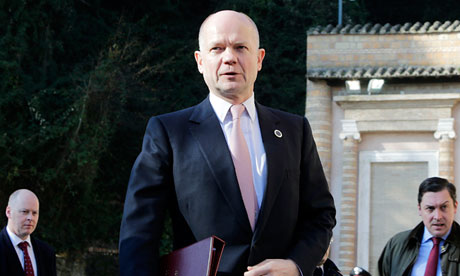 William Hague at the Friends of Syria meeting in Rome, where he stressed that military aid was possible in future.
William Hague at the Friends of Syria meeting in Rome, where he stressed that military aid was possible in future.